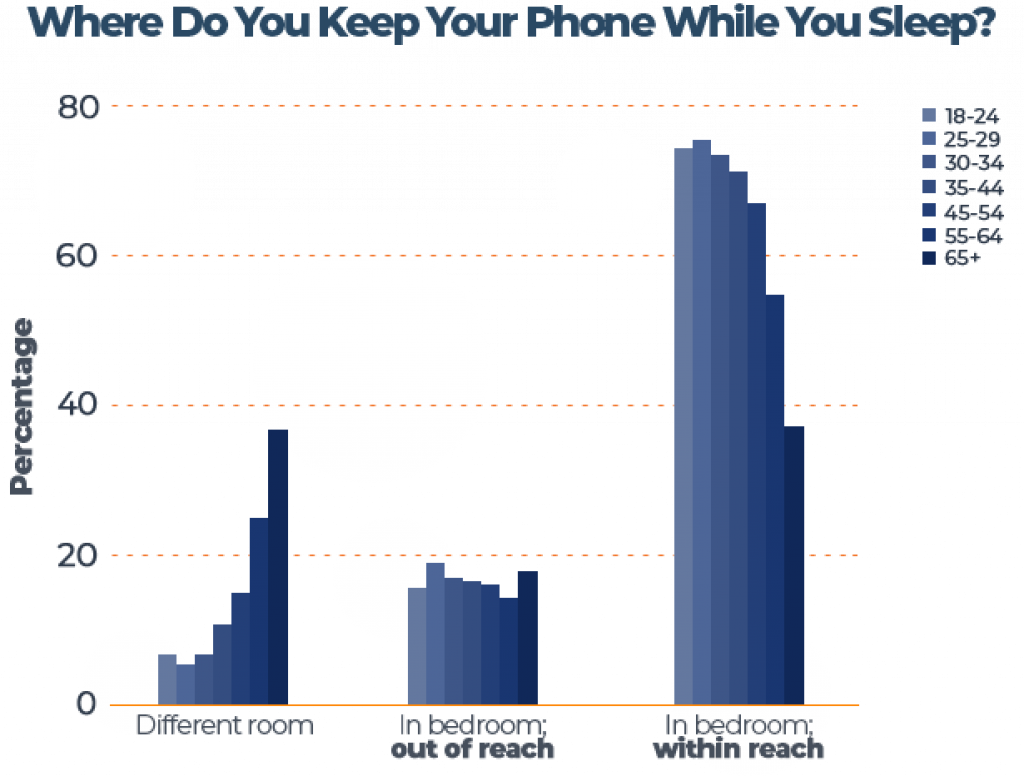One third of Americans average less than 6 hours of sleep a night, which is significantly less than 15 years ago[1]. Technology might be one of the reasons why.
Think about your typical nighttime routine: You’ve showered, brushed your teeth, changed into pajamas, and now you’re climbing into bed. First, you need to plug in your phone, though. The screen lights up, and you have a few notifications. So you check them, and then you check your email before finally making your rounds with social media.
Before you know it, 45 minutes have passed. Not only are you still not asleep, you’re not even tired anymore. Ninety percent of Americans have found themselves in a similar situation when using technology before bed[2].In this guide, we explore the relationship between sleep and technology, offer tips for a tech-free bedroom, and cover instances where technology may be more helpful – than harmful – to sleep.
How Technology in the Bedroom Affects Sleep
Before we get into the impact of technology on our restfulness, let’s briefly discuss how sleep works. Our bodies follow a natural clock called a circadian rhythm. Think of it as an alarm clock that tells your body when it is time to get up and go to bed.
When it gets dark, your eyes recognize that it is time to go to sleep, which sends a signal to your brain to tell your body that it should be tired. Your body then releases melatonin, a hormone that helps balance wakefulness and sleepiness. If this natural circadian rhythm gets disrupted, your sleep suffers.
Outside factors can affect this “clock”, including those from technology. Technology can disrupt your circadian rhythm by exposing your body to various forms of light during times when your body should be prepping for bedtime. Below, we explore this concept, as well as other ways technology in the bedroom affects sleep.
1. Artificial Light
Can you imagine actually going to sleep when the sun goes down and waking up as it rises? Believe it or not, our bodies are meant to work that way. That is, until artificial light entered the scene. Artificial light, which comes from overhead lights, lamps, candles, and even your television, has shifted our daily schedules so that we are awake longer at night — for better or worse.
Studies show that exposure to artificial light interrupts your natural circadian rhythm[3]. Once your body is exposed to light, your brain sends a signal to decrease melatonin production. Reduction in melatonin then leads to poor sleep quality and daytime fatigue.
2. Blue Light
It is not just light in general that is the problem; blue light, in particular, tells our brains it is time to be awake. Blue light comes from smartphones, tablets, laptops, and computer monitors. Studies show the strongest wavelengths for our natural body clocks in the electromagnetic spectrum are blue[4].Twenty volunteers were randomly assigned to wear either amber or yellow-tinted glasses for three hours before going to bed; amber blocks blue light, and yellow-tinted glasses only block ultraviolet light. The results showed that those wearing amber glasses had significantly improved rest than the other group.
3. Noise Pollution
Noise pollution is essentially any sound that can get in the way of sleep. For many people, a quiet room is a necessary part of their sleep environment, but many people tend to fall asleep with the television on or with their phones’ alert sound on.
Both of these things can affect your sleep negatively. Studies show noise pollution can lead to sleep disruption and insomnia[5].
4. FoMo
Just because it is time for us to go to sleep does not mean the world stops. Fomo, defined as the fear of missing out, is a term that has become more relevant in recent years[6]. Between a 24/7 news cycle and widespread use of social media, the need to constantly stay up to date on the latest happenings has negatively impacted society, particularly when it comes to sleep.
Social media can be wildly addictive – research estimates over 210 million people worldwide experience social media addiction – since it triggers the release of the brain’s “feel-good” chemical known as dopamine[7, 8]. Pair that with the fact that 71 percent of Americans sleep with their phones within arms reach, and it’s no wonder people are getting less and less sleep[9].
Plus, that blue light we talked about earlier can confuse our brains as to what time it is, making it difficult to rest long after we log off for the night.

Kids, Technology, and Sleep
The impact of electronics before bed is even worse for children. Rest is crucial for their minds and bodies to develop properly. However, children are unfortunately among the largest consumers of tech[10].
In a survey of parents of children aged 8 to 17, researchers found that children who played video games or watched television before bed got 30 minutes less sleep, and those who used a phone or the computer reported 60 minutes less sleep and more difficulty falling asleep[11].
At a time where 40 percent of children have phones by the time they are in fifth grade and 42.4 percent of children between the ages of 6 and 10 have a television in their bedroom, limiting technological use before (and after) bed is more important than ever[12].
Cyber Bullying
Bullying has always existed, but children with tech may struggle to escape it. A study from the University at Buffalo found that 15 percent of teenagers are bullied online. These teens are more likely to experience depression, which then leads to negative changes in sleep patterns[13].
Stressful Media
We cannot always control what media our children are exposed to, and this rings even more true when it comes to technology. A recent study showed that among thousands of children, TV content appeared frequently in nightmares for nearly a third of the children[14].
Try to keep an eye on the material your children are taking in, especially before bed.
How to Create a Tech-Free Bedroom
So, now that you know just how harmful technology in the bedroom is, how can you eliminate it? Below, we included tips on how to create a tech-free bedroom.
Remove Technology
The best way to create a tech-free bedroom is to — surprise, surprise – remove technology from the bedroom. This may be difficult to implement for some, so start by making small adjustments. Instead of putting your phone on the nightstand right next to your bed, think about placing it across the room.
If you find yourself impulsively checking social media, turn your phone on Airplane Mode (or turn off cellular data and WiFi if you need to receive emergency calls) so that your phone cannot connect to the Internet.
The American Academy of Pediatrics even suggests setting a digital curfew for your family to avoid tech from interfering with rest. The earlier the better — putting phones and other electronics away three hours before bed is ideal[15].
If that is not something you think you can do, change your phone settings to “Night Mode,” where the screen turns into a warmer tone and decreases exposure to blue light at a certain time each day.
Are you someone who needs noise from the television to fall asleep? Consider using a white noise machine or fan instead. To eliminate other noise pollution, turn your phone on Do Not Disturb to avoid those pesky notifications. (If you use your phone as an alarm, Do Not Disturb mode should not affect it.)
Explore Alternative Nighttime Activities
Less nighttime screen time may be better for your health, but what should you do instead? Luckily, there are a number of evening activities that can ease you into bedtime, none of which include a Netflix binge.

Have a Relaxing Bedtime Ritual
Finally, the best way to create (and stick to) a tech-free bedroom is to follow a relaxing bedtime ritual that gets you ready for bed. Below are a few suggestions you can include in your nighttime routine:
- Practice yoga before bed: The power of yoga before bedtime should not be underestimated. What better way to wind down for a long night of rest than stretching your body and releasing pent up stress from the day? Yoga before bed slows down your breathing, lowers blood pressure, and puts you in a state of deep relaxation[16].
- Take a warm shower: Studies show a warm bath or shower before bed helps cool you down by lowering your core body temp. This activates your circadian rhythm and lets your body know it’s time for bed[17].
- Read a book: Reading before bed has been shown to improve sleep quality by helping you fall asleep faster and for longer[18].
- Journal or meditate: Both activities have the same effect – relaxing your body by forcing you to focus on the present moment[19]. Either practice is a great way to unload stress from the day and clear your mind for a good night’s rest.
Sleep Technology: Is Some Technology Good for ZZZs?
Technology is not all bad. In fact, some tech may actually improve your rest. When we say sleep technology, what we’re really referring to is any technology that’s designed to help your sleep, not hurt it.
This can come in the form of white noise machines, which help drown out unwanted noises, and are great for those who live in cities or just need sound to fall asleep. Another popular form of sleep tech is blue-light blocking glasses, which should be worn for a few hours before bed to prevent blue light from interfering with your natural circadian rhythm[20].
Sunrise alarms are gaining popularity — rather than waking up to a shrieking alarm clock, a gentle light gets brighter and brighter, helping your body wake more naturally. The exposure to gentle light also plays into your circadian rhythm. Your body enjoys being exposed to light almost immediately upon waking[21].
Sleep trackers, which are used with a smartwatch or smartphone app, track the quality and amount of rest you get each night. However, we do want to mention that for some, this data can be more stressful than helpful, so keep that in mind. (Yes, sleep tracker-induced insomnia is a real thing)[22].
Last Word of Advice
We’re not underscoring the fact that technology has brought some incredible inventions into our lives. However, there’s no denying that nighttime technology use can get in the way of our sleep. Children specifically suffer from the effects of late-night tech, and those hours of sleep can add up quickly.
That doesn’t mean your sleep has to suffer, though. By creating a tech-free bedroom, replacing evening activities with fulfilling hobbies, and following a relaxing bedtime ritual, you can avoid the detrimental effects technology has on rest.
The bottom line? Remove technology from the bedroom and watch your sleep improve.
References
[1] “Americans are sleeping less than they were 13 years ago”. Science News. Last modified Dec 21, 2018.
[2] “The Use of Technology at Night: Impact on Sleep and Health”. Journal of Clinical Sleep Medicine. Last modified Dec 15, 2013.
[3] “I Can’t Sleep… Can you turn off the lights”. Harvard University. Last modified Oct 13, 2020.
[4] “AMBER LENSES TO BLOCK BLUE LIGHT AND IMPROVE SLEEP: A RANDOMIZED TRIAL”. Journal of Biological and Medical Rhythm Research. Last modified Feb 23, 2009.
[5] “Noise pollution can lead to sleep issues, chronic health problems”. Harvard School of Public Health. Last modified Feb 2, 2024.
[6] “Fear of missing out: A brief overview of origin, theoretical underpinnings and relationship with mental health”. National Library of Medicine. Last modified Jul 6, 2021.
[7] “Are you addicted to social media?” Lee Health. Last modified 2024.
[8] “Life satisfaction: A key to managing internet & social media addiction”. Science Direct. Last modified Aug 2017.
[9] “Here’s how many Americans sleep with their smartphones” Fortune. Last modified June 29, 2015.
[10] “Teens and Technology 2013”. Pew Research Center. Last modified March 13, 2013.
[11] “Bedtime Use of Technology and Associated Sleep Problems in Children” National Library of Medicine. Last modified Oct 27, 2017.
[12] “Children’s engagement with digital devices, screen time”. Pew Research Center. Last modified July 28, 2020.
[13] “For teens, online bullying worsens sleep and depression”. Science Daily. Last modified May 9, 2019.
[14] “Tech at bedtime: Do electronic media devices cause sleep problems in children?”. Parenting Science. Last modified Dec 2021.
[15] “How to Make a Family Media Use Plan”. American Academy of Pediatrics. Last modified Nov 30, 2020.
[16] “Benefits of Yoga Before Bed”. North Shore University Health System. Last modified June 19, 2018.
[17] “A Warm Bedtime Bath Can Help You Cool Down And Sleep Better”. National Library of Medicine. Last modified July 25, 2019.
[18] “Does reading a book in bed make a difference to sleep in comparison to not reading a book in bed?” National Library of Medicine. Last modified Dec 4, 2021.
[19] “The positive impact journaling, mindfulness and meditation could have on your sleep” Chronicle Live. Last modified Nov 14, 2022.
[20] “Evening wear of blue-blocking glasses for sleep and mood disorders: a systematic review”. National Library of Medicine. May 24, 2021.
[21] “Effects of light on human circadian rhythms, sleep and mood”. National Library of Medicine. Aug 20, 2019.
[22] “Science Has Identified a New Sleep Disorder Caused by Sleep Trackers”. Inc. This Morning. Apr 4, 2018.

Jess Carpenter
Content Writer
About Author
Jess is only serious about a few things in life: sleeping, writing, and making the perfect chocolate chip cookie. In her free time, you’ll probably find her having a dance-off to ‘80s pop with her family or watching scary movies with her cat, Waffles.
Combination Sleeper
